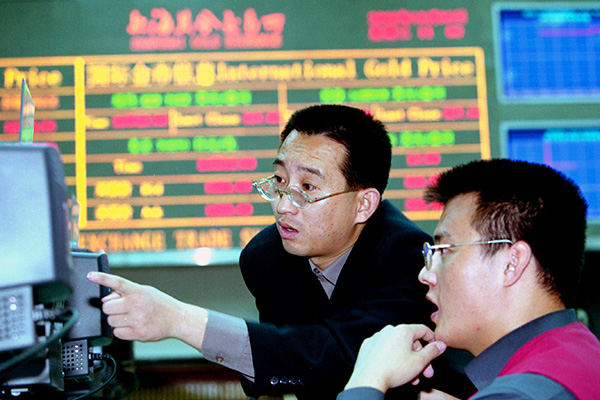|
 |
|
Corporate bond prices hit a six-year high since the stock market crash in June. The surge in the bond issuance and the declining coupon rates have prompted fears that another bubble may be forming in the country's overheated bond market. [Photo/China Daily] |
Analysts attribute bull run to risky-looking stock market, sustained monetary easing, and declining interest rates
Despite rising debt defaults by Chinese companies, the corporate bond market will continue to surge on sustained monetary easing and declining interest rates, analysts said.
Corporate bond prices hit a six-year high since the stock market crash in June as investors shifted capital to the relatively safer bond markets.
Corporate bond issuance also hit a record high. In the January-August period of this year, Chinese companies issued bonds worth 276.3 billion yuan ($43.6 billion) that are traded on the Shanghai Stock Exchange. Their value rose by 233 percent year-on-year, according to data research company Wind Info.
Meanwhile, yields on many top-rated corporate bonds due in five years have dropped below 4 percent, narrowing the gap between them and gilt yields.
Yield on the newly issued 10-year government bond also dropped to 2.99 percent last week, the lowest since 2008.
The surge in corporate bond issuance and the declining coupon rates have prompted fears that another bubble may be forming in China's overheated bond market after the burst of the country's equities bubble.
But analysts attribute the bull run in the bond market to falling interest rates and monetary easing, which, they say, will help ease companies' debt pressure and prevent an escalation of defaults.
"China has entered an era of sustained low interest rates, which is the fundamental factor that supports our judgment that the bull run in the bond market will continue," Jiang Chao, an analyst at Haitong Securities, said.
"When the real economy is offering poor investment returns, large amount of capital will flow into financial assets, which will further push down interest rates," he said.
Some analysts pointed out that a technical correction in the bond market is likely, but it will not be substantial as investors face limited alternative investment options. There are not many fixed-income assets to replace bonds amid the economic slowdown.
Ivan Chung, a credit analyst at global ratings agency Moody's Investors Service Inc, said the market is already anticipating more bond defaults by companies as there would no longer be "automatic bailout" by the government as long as the default is an isolated event and does not trigger systemic risks. China has seen four defaults this year including Baoding Tianwei Group Co, the first State-owned company that failed to meet its debt obligation.
"It is natural to have defaults in market-oriented bond markets. Despite the increasing risks, we think the defaults in the Chinese market will be small relative to the gigantic 40-trillion-yuan domestic bond market," Chung said.
While the chances for the overall bond market to crash are slim, analysts have warned about the leveraged trading of bonds listed on the stock exchanges.
Many institutional investors have used their holdings of bonds as collateral for refinancing, to purchase new bonds, which could serve as a potential destabilizing factor in the bond market, Jiang at Haitong Securities warned.
